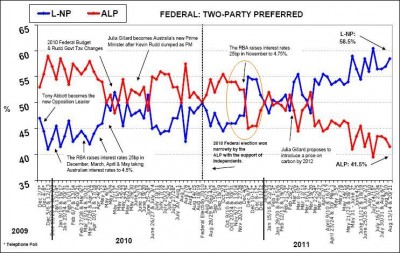I’ve been an Apple user since 2006, but I’ve been a Windows user since 1993 – the sheer gravity of Microsoft Windows on the computing landscape is inescapable, and it’s given me a certain amount of perspective: you can’t be ideological about what you use to get your work done[ref]Or at least, it doesn’t help. YMMV.[/ref].
Last week, Microsoft introduced the upcoming Windows 8 at its BUILD conference to an audience of developers. In many ways, it’s almost the direct opposite of what Apple would do – introduce to devs and market to devs the biggest change in the user interface since Windows 95, instead of a consumer-friendly presentation. The key here is that Microsoft needs developers on board much more than they need the consumers – for all the hype Apple gets, it’s still only around 10% of the computing market, and the overwhelming weight of Microsoft in the corporate environment will give Windows inertia for years.
Windows 8 does something totally different, though: it pivots Microsoft’s market towards the consumer. This is a user interface that takes Windows Phone 7 and turns it up to 11 – everything is big fonted, with broad splashes of colour and blocks as the “icons” of applications, all geared towards touch. The traditional desktop-and-window application model that defines the name “Windows” is relegated to a “Classic”-style compatibility mode.
Microsoft is pitching this as the unifying OS, bringing tablets and desktops together, but what we’ve seen thus far of the OS suggests tablets and touchable screens are the way of the future as far as Microsoft is concerned, and the old-school of peripheral-based computing is a legacy to be supported.
To Microsoft’s credit though, that legacy is supported – as evidenced by the free public release of the developer preview build. You can go download it here, install away on any device[ref]Min requirements: 1GHz, 1GB RAM, 16GB HDD, DX9 Graphics – but it runs on virtual machines – I’m using VirtualBox[/ref] you so chose (with the obvious caveat emptor about being pre-release software), and have a play with it. That’s something you’d never see from Apple, and it goes to show – in my mind – the extent to which Microsoft is trying to get developers and cutting-edge users on board before this thing goes “live”.
Windows 8 is a complete rethink of how Windows works, and it will polarise. No longer are you opening programs from shortcuts to live in confined windows alongside other programs – you “tap” a “tile”, launching the program full screen. You do actions with swipes and taps, programs interact through “contracts”, and the idea of multitasking takes a bit of a back seat. Even IE 10 in “Metro” mode goes down the Apple route – no third-party plugins supported. This spells the end for Flash as we know it, if Windows too plunges the knife into Adobe’s back.
This is all not to say that touch is the only way to go – after all, this is a unifying effort. Windows offers the cop-out of Desktop mode, instantly familiar but also instantly dated in comparison to Metro-based apps. The desktop view is not designed for touch, so it’ll be interesting to see how this integrates into the wider Windows environment.
I’ve played around with the dev build in a virtual machine, and it really intrigues me as to where Microsoft is going with this. Metro really is a bottom-up rethink – it would be easier to get most people to understand the pivot from Windows to Mac than Windows 7 to Windows 8. Microsoft is taking that risk, willing to see the experiment through to ensure that a unified approach is being used for the OS. It’s admirable that there’s no desire to fracture the OS, but sometimes its unclear which will be the lead element of the design – for instance, Metro’s control panel doesn’t have half the options and offers the kick out to Desktop mode Control Panel to grant you full control.
All in all, I like it – it’s refreshing to see a fresh approach from Microsoft, and in taking the big & bold aspects of Windows Phone 7 to the full desktop scale, Microsoft has brought innovation back to the field. While Windows 8 currently feels built-for-touch, I’m sure Microsoft will refine this to make it more palatable to non-touch users prior to release. The Metro UI forces a total rethink on the developer, and some will thrive while others falter. This goes doubly so for software framework providers – Flash and Java appear to have their days numbered in the new format, and Microsoft are obviously pushing hard to enforce some control over their environment.
What does this mean for enterprise? I would suspect many IT managers are looking at Windows 8 with a lot of dread. Windows 7 tweaked the taskbar, but fundamentally you could follow the idea of programs and program management through from Windows 3.1. Windows 8 asks you to change your paradigm entirely, and those custom built VB6 programs from the guys you had spare after the Y2K bug was fixed are finally going to bite the bullet in terms of seamless experience. This is going to be a hard transition, and some users will be alienated along the way – I wouldn’t put it past Microsoft releasing a “professional” edition for non-touch devices where the traditional desktop remains the primary focus.
Finally, what does it mean for Apple? Simple: They’ve got a fight on their hands.

